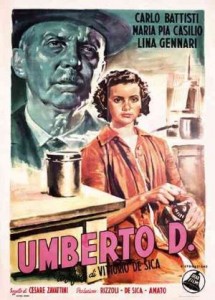
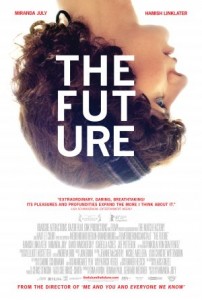
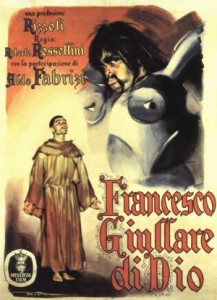

Umberto D. (1952, Vittorio De Sica) – 7.0
So Wendy and Lucy really was Reichardt’s stab at Italian Neorealism. It’s not the dogs’ ‘dogness’ that makes these films’ finales so heartbreaking, obviously, but their inabilities to comprehend the reasons for their future heartbreak (yes, I believe these dogs will be heartbroken when they realize they’ve been bastardized), which first hits Umberto, as he is dismissed by society, thus spreading to the dog’s fate. The landlady is too villainous, and the young girl too self-serving, but kudos for not making Umberto himself very sympathetic. After he throws poor Flike onto his landlady as revenge for letting him loose, he becomes just as laughably misbehaved and irrational as the other wretches patrolling Rome circa 1952.
The Future (2011, Miranda July) – 7.6
[Spoilers throughout] Goddamn the haters for making me feel guilty for pretty much loving Miranda July. Treating life as if every gesture were a performance art act, she transcends the tweeness by accumulating solid, simple ideas that resonate on a purely human level, and then obliterating the airy worlds of her protagonists with a hit of real-world consequences. Sure there’s the cat (which is not a narrator, by the way; he tells no story but his own), and she plays the same Beach House song about two dozen times (a great song, at least). The worst that any of the first half of this film could be charged is for being ‘too cute’ – perhaps the same as quirky, maybe even hipster, and almost certainly twee. But it’s building up these layers to present a lifestyle that is incapable of really dealing with the real world – genuine drama and pain and suffering: the things that real quirkfests love to forget about. There’s a cat that speaks (or probably just thinks) in English, what’s the worst that could happen? These guys are so damn cute for each other, they’re adopting a wounded cat and cancelling their internet service. Too cute. Things derail, though, when one of Sophie’s (July) gestures (she calls a guy that drew a kitschy portrait of his daughter, and tries to determine where they are in relation to each other by looking at the clouds) gets away from her and starts to become part of a different kind of lifestyle…a different kind of movie. When Marshall and Sophie first speak to each other on the telephone, and much more so when they meet in person at Marshall’s home, there is enough sexual tension to suggest where this is going, but I consciously thought to myself something like ‘if this were another movie, these people would totally start an affair or something’. And then they do. And then Jason’s magic powers to stop time become ‘real’, and the moon starts speaking, trying desperately to change the film back into what it was supposed to be, and yet Sophie’s time moves on in a kind of parallel world straight out of a Lynch film, only it’s disarmingly Normal. Like a movie playing in another room, this thread progresses at an accelerating speed that moves forward as if on a mission to get it all in before the 90 minutes are up, defiantly situating itself to end in the exact way that this film, as it began, had no chance of ending. It’s one of those films that I can only really defend by jiving with it and then acting stupefied at those who couldn’t likewise jive, but this is just a magical movie, through and through.
The Flowers of St. Francis (1950, Roberto Rossellini) – 5.1
Fine enough, but what the hell is going on with the acting? I know they’re real monks (now), but Francis’ expressions of grief are downright presentational in their stilts and hamminess. It works though, in its own way, because these men are supposed to be actively naive, forgiving, and all-loving, and their performances lent a childlike purity that made their actions even sweeter, almost precious, even.
Lawrence of Arabia (1962, David Lean) – 6.3
As engaging as a huge, blockbuster epic with a climax of two gigantic armies stampeding toward each other is going to get for me. Most affecting moment is easily Lawrence’s confession that he enjoyed his execution of Gasim, which was great but unfortunately seceded by two hours more of film that essentially makes that trait clearer and more extreme. What happens when an egotistical and ambitious man who has been put in charge of a large army also finds himself to be highly sadistic? He gets the job done, that’s what. Glad I finally saw it, but it’s a bit too tidy, even at four hours, to motivate a revisitation in the future (my problem with most of the canon, hence my avoidance).
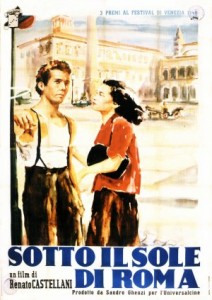
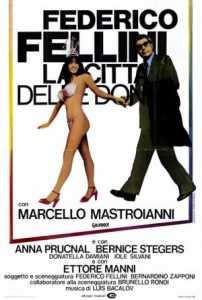
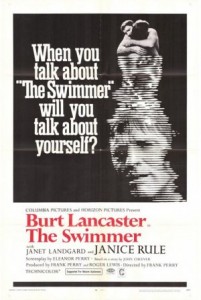
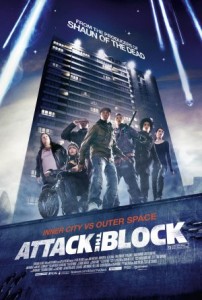
Under the Sun of Rome (1948, Renato Castellani) – 6.5
Who? What? Huh? Why I’d never heard of this film or filmmaker before now boggles the mind. This is a major entry in Italian Neorealism, with photography heavily influenced by French Poetic realists, and some of the most superb non-professional acting I’ve yet encountered. Little touches, like the shots during the boxing match when the fighter is punching Ciro as shown through the perspective of a jug of water, just elevate it even more above the films typical of the era. Features some of the starkest tonal shifts pre-dating Cassavetes, usually between people (Ciro’s make-up then breakup with Iris), but also extending to the mise-en-scene as it abruptly puts on the breaks of adolescent summertime patrolling to harsh war-time panic. All of the key characters seem to love and hate each other, always. I’m not yet prepared to address the blatant homoeroticism going on between Ciro and Geppa, but it’s totally there in the ‘Primo tempo’.
City of Women (1980, Federico Fellini) – 5.0
As pointed out by my new friend Scott, this is essentially an amalgam of 8.5 and Casanova, for better and worse. For all of the attention drawn to Fellini’s fascination with Jung, he sure shows a low capacity for subtext. Angry feminists, copious phalli, a rooster mounting a cat (get it?), and a final shot of a train rushing into a tunnel (DO YOU GET IT???), he tries to reconcile how juvenile archetypes shaped, tortured, and nurtured his sexuality; it is at once too universal and obnoxiously self-absorbed. The film is essentially a trip through Fellini’s Phallic stage (to mix psychoanalysts’ metaphors) which potentially never reached latency, explored as a dissection of his dream-state psyche. While many of my favorite films could be described that way, it is really only valuable when coming from those whose psyches house more complex desires and thoughts that Fellini’s apparently does.
The Swimmer (1968, Frank Perry) – 6.6
Love the idea, but the execution is hit-and miss (the ‘hits’, though, are doozies). I had to look up Nathaniel Dorsky’s wikipedia page to make sure that he didn’t start making films after this – his first shorts, which I’ve recently seen in Chris Kennedy’s Early Monthly Segments at the Gladstone Art Bar (end plug), were made just a few years earlier, though Dorsky wasn’t yet making the type of work that I thought was evoked here – because there are several impressionist passages that are tied directly to Dorsky’s signature poetic style (at least, to his Compline, Aubade, and Pastourelle that played in the TIFF 2010’s Wavelengths sidebar). This isn’t even touching on the other big art extract, Hockney’s pool paintings, which he began making in ’67, just a year before this film’s release (these are probably coincidences, or maybe these guys had more connections to each other than I am able to source out). Anyway. Lancaster’s physique is really the star here; at first well-sculpted and youthful when first glimpsed emerging from the woods toward his first pool, gradually exposing scars, wrinkles, crevices, and flab that show a weathered and worn man past his prime, struggling – like all of the bourgeois elite he encounters – to retain the significance and ideals of their past. I couldn’t decide if Perry was embracing an intentionally hammy vibe striving to make this into a readymade cult picture, or if that was all just inherent in the film’s ideas and its casting of Lancaster. Either way, it downplays the weight of Ned’s deterioration – the exact opposite of an ‘awakening’ that the film’s premise hints at – and makes many moments that should be heart-wrenching into giggle-worthy cringe-inducers.
Attack the Block (2011, Joe Cornish) – 5.4
British humour has always been a bit lost on me, a fact I finally accepted when I laughed exactly four times at In the Loop. It’s a combination of my difficulty with hearing the words they’re saying, and that I know next to nothing about the cultural quirks that are the subject of so many of the jokes. Or does it all hinge on the fact that they talk funny. This is not to say that Attack the Block is a comedy that I did not appreciate because I didn’t think it was funny, but that I couldn’t imagine this generating the kind of buzz it has without its supporters thinking it was a laugh-a-minute riot, because as an alien invasion film, it’s solid, but certainly not fresh. The aliens are minimal and actually look pretty cool with their emerald-glowing teeth and opaque fur. I could also discern its socio-political value (though, again, not something I’m exactly familiar with), which gives it points for ‘saying something’. But really, it’s a predictable, structurally by-numbers film with only sketchily drawn characters and a groovy soundtrack. Cornish avoids all opportunities to let his film become necessarily unhinged, and his determination to end the film on that smile is too schematically set-up.
